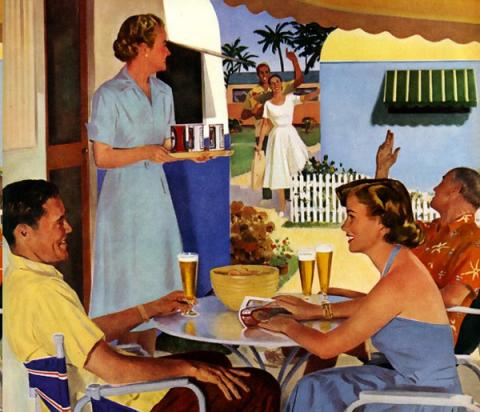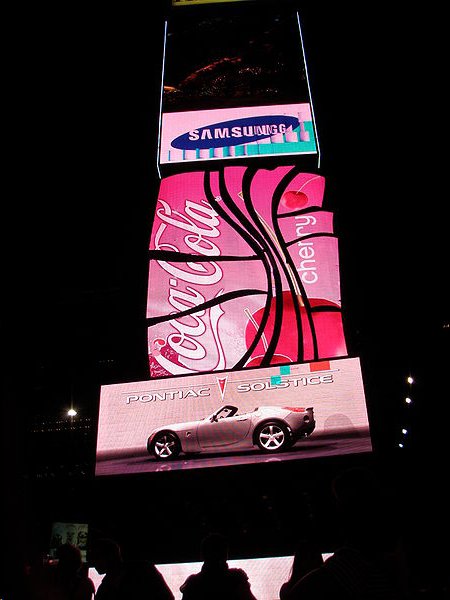Dead Culture: How Our Culture Became Stagnant

"Do not assume that order and stability are always good, in a society or in a universe. The old, the ossified, must always give way to new life and the birth of new things. Before the new things can be born the old must perish. This is a dangerous realization, because it tells us that we must eventually part with much of what is familiar to us. And that hurts. But that is part of the script of life. Unless we can psychologically accommodate change, we ourselves begin to die, inwardly."
-Philip K. Dick
An ad man for potato peelers has a dilemma. Well, as serious an issue as potato peeler marketers could encounter. He has to increase sales for a lifetime product that everyone already owns. And so, the ad man hatches an ingenious plan to boost sales. He takes the potato peeler and makes it look brown, dirty and dry — like a potato. It works. By designing the potato peeler to look like the skin of a potato, he coaxes (the author believes "educates" is the proper business term) Consumers to accidentally toss the camouflaged peeler away with the rest of the peels. Then, consumers replace the lost peeler - rebooting the cycle. This recurring phenomenon drives sales past any possible predictions. The ad man becomes the unlikely spud, er, stud of the potato peeler economy.
"You're listening to 102.5 kzok: the classic rock station," the automated station identification announces before launching into the next set.KZOK, a fixture in Seattle since 1974 and part of the CBS radio division, has been operating in its current music format for 25 years. Impressive, considering their competitors are constantly reinventing themselves to catch up with the zeitgeist or new market research. It's impressive -- and slightly disconcerting. KZOK’s compendium of classic music has remained unchanged for 25 years: the same music, the same motif and the same success (they've hovered in the top-five ratings for several years). It is a station entirely resistant to change, despite the introduction of new musical concepts, new genres and aging rock tracks nearing classic status. Classic rock writ eternal.
These two accounts detail separate phenomena but contribute to one noumenon: cultural stagnancy.
The End of History Culture
A once-fashionable read for cognoscenti and intrepid '90s college students is Francis Fukuyama's “The End of the World. In EOW, Fukuyama argues that political evolution has reached its finality, and the peak of evolution is liberal democratic capitalism (his syllogism is a logical sieve at best. For a serious defenestration of Fukuyama, read any of Slavoj Žižek 's ferocious canon). Fukuyama invokes Hegel's description of the driving force of historical process, that is, the struggle for recognition (or thymos, as Fukuyama insists on calling it) as most at home in liberal democratic capitalism (henceforth referred to as LDC). While LDC has yet to be recognized at its fullest potential, states Fukuyama, Westernized culture is the best conduit for Hegel's thymos.

The counters to Fukuyama's liberal-democratic-capitalism-end-of-history argument are predictable enough: the Internet (The Internet feeds off the desire to be recognized and hardly resembles a liberal democracy [Did Hegel anticipate an Internet-esque organism? Is the Internet the final stage of our historical process? Next, on UPN]), his eschewing of the countervailing forces of corporate-capitalism vs. democracy (a glaring error he happily omits while gushing over liberal democracy) and his flimsy appeal to Marx seen below:
". . . the egalitarianism of modern America represents the essential achievement of the classless society envisioned by Marx . . . the root causes of economic inequality do not have to do with the underlying legal and social structure of our society, which remains fundamentally egalitarian and moderately redistributionist."
While Fukuyama's defense of liberal democratic capitalism may fall flat, he delivers incisive commentary on Westernization: "More important is the contribution that Japan has made in turn to world history by following in the footsteps of the United States to create a truly universal Consumer culture that has become both a symbol and an underpinning of the universal homogenous state." The phrase "universal homogenous state" reeks of stagnancy, and as Consumer culture stalks the globe, humanity steers perilously close to the society of Aldous Huxley's Brave New World. As the World Controller Mustapha Mond (straight from the horse's mouth) explains in BNW: "You can't make flivvers without steel — and you can't make tragedies without social instability. The world's stable now. People are happy, they get what they want, and they never want what they can't get . . . they're so conditioned that they practically can't help behaving as they ought to behave." Western culture caters to our approximations of comfort, and as antagonizing forces recede in creative culture, the catalysts of artistry and counterculture disappear.
Why Culture Needs Antagonizing Forces
The forces of antagonism don't create culture, they kindle creativity. Machiavelli suffered under the House of Medici and wrote The Prince. The Harlem Renaissance responded to racism, segregation and classism with art, poetry and music. Philip K. Dick uses his religious mania to create some of the most intriguing passages in literature. To quote Orson Welles: "In Italy for 30 years under the Borgias, they had warfare, terror, murder, and bloodshed, but they produced Michelangelo, Leonardo da Vinci, and the Renaissance. In Switzerland they had brotherly love - they had 500 years of democracy and peace - and what did that produce? The cuckoo clock."

What happens when these antagonisms fade? Consumer culture, as Fukuyama observes, creates a homogenous state. The products of a Consumer culture strive to make life easy and comfortable (consider Corona: their marketing yokes Corona to easy living. It's the work hard, consume hard paradigm). Contrived antagonisms exist (i.e., I hate the rival sports team, but I love the sport), but only to strengthen the prevailing Consumer culture (feverishly buying products to demonstrate your support for the hometown team, attending games, discussing matchups, etc.). As Consumer culture becomes the prevailing ideology, where are the antagonisms that drive culture? Where's the Vietnam War, where's H.L. Mencken? Gone. All that's left is a cultural stagnancy and decay and the engine of Consumer culture: consume-recycle-consume.
Consuming the Past
An Onion Newspaper article reads: "We may be running out of past." The national crisis continues in the lede: "At a press conference Monday, U.S. Retro Secretary Anson Williams issued a strongly worded warning of an imminent 'national retro crisis.,' cautioning that 'if current levels of U.S. retro consumption are allowed to continue unchecked, we may run entirely out of past by as soon as 2005.'" The author not-so-subtly lampoons and somewhat subtly criticizes the omnipresent Western marketplace of nostalgia. As insatiable Western cultures devour past fads and appropriate faded archetypes into modern-day catalogues, our cultural fixations continue to live in the past with well-trimmed beards and electric cars. The result? As Anson "Potsie" Williams cautions: We're out of consumable history.
In the meantime, no new cultural undercurrents are rising to the fore. America is recycling past cultures into pastiche chic-for-sale and refusing to manufacture new cultural phenomena. Why? There are two theories for this: Either Western culture lacks the antagonistic forces that foster creativity or creativity is savvily excluded from Consumer culture by the powers that be. It's safe to assume stagnancy precludes creation; therefore creativity is the main factor in determining whether Western culture is indeed stagnant.
A Stagnant Culture is a Dead Culture
In Kurt Anderson's Vanity Fair article, You Say You Want a Devolution, he accuses corporations of resisting destruction by creativity, the very force that drives culture and capitalism:
"Today, Starbucks [sic] doesn’t want to have to renovate its thousands of stores every few years. If blue jeans became unfashionable tomorrow, Old Navy [again, sic] would be in trouble. [KZOK refuses to redefine the era of classic rock, yet so many artists now qualify for classic rock status]. And so on . . . Capitalism may depend on perpetual creative destruction, but the last thing anybody wants is their business to be the one creatively destroyed.

Corporations have long perverted capitalism for personal benefit. The newest, potentially fatal iteration of capitalism verges on a corporate form of cannibalism. By rejecting the principles of creative destruction, corporations may arguably destroy the edifice of capitalism that legitimates their proclivities. If this departure stays the course, capitalism will cease to exist, replaced by the economic model of the corporation.
Obligatory Criticism of Advertising
As industrial revolution and post-industrial revolution inventions perforated the market place (the toaster, the dishwasher, the automobile) advertising reached a breaking point (one that ultimately turned them into the ubiquitous force they are today). From the nascent stages of contemporary marketing, two pillars of advertising emerged. The first to materialize: planned obsolescence (products should be designed for imminent irrelevance and impotence). Second pillar: it's easier to market updates, modifications and additions than marketing an entirely new product. These two foundations continue well into the present.
An example: Consider the X-box. Instead of designing new consoles, Microsoft promotes (well, modifies) the X-box into the X-box 360. Furthermore, Microsoft designs the 360 with backward compatibility and disallows forward compatibility to make marketing the product easier (the X-box faithful would refrain from purchasing the new X-box if their older model served the same function), and projections predictable and governable (because the 360 was marketed as a marked improvement upon the now obsolete original, it was assumed that the rate of consumption would more or less follow the same path as the original X-box). Next up, is the X-box 720 - a variation of the X-box theme. It's essentially the same product, but with the right amount of updates to make it preferable to the 360 and enough limitations to defer to its successor.
The Empowered Consumer
The top caste has only one fear: losing their economic stranglehold. When the flower children usurped the baby boomers and became business yogis, they expressed the process of creative destruction. Now, more aware of the tides of creative destruction than their predecessors, the reigning power structure safeguards from their own demise at all costs -- even when facing the threat of the empowered Consumer.

Social media gave rise to the age of the empowered Consumer. Brands today attempt to earn trust and establish rapport with the consumer by dialoguing with their base (as opposed to the Mad Men style of speaking at the consumer) through social media. To quoteIBM: "For retailers and product brands . . . . it is about winning them [consumers] over by anticipating their behavior and preferences, engaging with them on their terms. If retailers can listen, learn, anticipate, adapt, execute and excel, while interacting with growing “communities of we,” they can earn consumer trust and rewrite the rules of retail." And, digital media strategies are quite successful in this regard. The threat of the empowered Consumer was easily neutralized and converted to brand communities and advocacy.
An Overspecialized Species is a Dead Species
Remember the two pillars of marketing? They've normalized. Madison Avenue has systematically conditioned Consumers to behave "as they ought to behave," requesting modifications, updates and additions and tossing out the potato peeler with the peels. Despite the shift in the business-consumer dynamic, Consumer culture has remained by and large the same.
To encourage more sales, marketers are now pushing for specialization. Again, Anderson on overspecialization: "Tens of millions of Americans, the uncool as well as the supercool, have become amateur stylists—scrupulously attending, as never before, to the details and meanings of the design and décor of their homes, their clothes, their appliances, their meals, their hobbies, and more." Specialization is the newest iteration of the camouflage potato peeler, capitalizing on the desire for authenticity in a homogeneous state.
As culture ceases to be and subcultures dry up from the glut of overspecialization, more than culture suffers. An overly specialized species is a doomed species. By pushing corporate capitalism to its evolutionary limit, with micro-economies developing, budding and now wilting, corporations -- the crowned jewels of capitalism -- may disrupt the theoretical model of Western capitalism.
Deep Throat Said to Follow the Money. Also, the Conclusion
Deep Throat said to follow the money. And in our current economic structure, culture is beholden to the wealth of the shareholder. Shareholders' fear of departing from the proven formula lead businesses to develop barriers of entry, guaranteeing the current model while keeping at bay those forces that could destroy the paradigm in place. Culture, the heart of creativity, imagination and change, threatens the realm of money and power. And so, it's phased out like so many impertinent virtues of society that run counter to the will of the shareholder.
How do we reclaim culture? Western culture's stagnation isn't solely attributable to the lack of antagonistic forces or the savvy of the powers that be -- it's a prevailing composite of the two. Overspecialization in response to homogeneity; comfort over antagonism; and the conditioned behavior of the Consumer collapses culture into irrelevance. Countermining these market forces is a Herculean task that grows more and more futile. The nature of Consumer culture is a widespread phenomenon, and frankly, an unstoppable force. But objections can be made.
To encourage waste and consumption, the denizens of Brave New World are conditioned with the sticky jingle: "End not mend. End not mend." And when confronted with this, the protagonist asks: "Why?" The most important question a Consumer can ask is: "Why?" The adverb "Why" opens the floodgates for questioning. "Why do I feel compelled to purchase this product?" yields "What purpose will it serve?" and leads more specific questions like: "Will it take up space in my increasingly cluttered life? Can I make this product myself, and can I make it better?" "Why?" outs the manipulative nature of the potato peeler ad man and the noncreative consistency of kook becomes a nag.
By asking why, Consumer culture, with its shareholders, its marketing efforts and its anti-humanist and anti-environmental drive is exposed as one the darkest antagonisms of our lifespan. And that antagonism may be enough to spur the rebirth of culture.
Author Bio:
Tyler Huggins is a contributing writer at Highbrow Magazine.
Photos: Wikipedia Commons, Flickr (Creative Commons).





























































































































































































































































































































